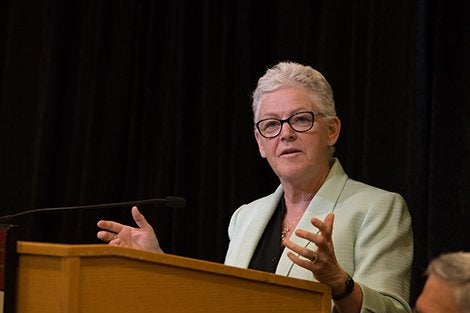July 30, 2018—Gina McCarthy is feeling hopeful. Despite efforts by the Trump administration to roll back environmental regulations and slash the budget of the U.S. Environmental Protection Agency (EPA)—where she served as administrator during President Barack Obama’s second term—McCarthy recently told an audience at Harvard T.H. Chan School of Public Health that there are actually plenty of reasons to feel optimistic about the current state of climate change policy.
Now director of the School’s Center for Climate, Health, and the Global Environment (C-CHANGE) and a professor of the practice of public health, McCarthy is working to get the latest environmental research into the hands of business and government leaders. Most people believe that climate change is real, she said, and many are eager to innovate. What’s more, the Boston native noted, environmental regulations are “wicked hard” to change, meaning that efforts by the administration to roll them back may not stand up in court.
McCarthy began her July 24, 2018 Hot Topics lecture, held in Kresge G2, with a quick spin through her more than 30-year career in public health and environmental policy. She served under five governors—most of them Republican—in Massachusetts and Connecticut, where she was instrumental in developing the Regional Greenhouse Gas Initiative, a multistate effort to reduce emissions contributing to global warming. As EPA administrator, McCarthy developed the Clean Power Plan, which set the first-ever national standards for reducing carbon emissions from power plants, and she championed rules to cut mercury emissions, increase fuel efficiency in cars, and protect water resources.
She reminded her listeners that not long ago, the country’s environmental picture was far darker than it is today. Los Angeles was smothered in smog. In the Northeast, waterways around mills changed color based on the textiles being produced that day. But a series of effective environmental laws dealt with these problems, she said.
“If you don’t think that environmental regulations have brought about a healthier world, you are incorrect,” she said, adding that when they are done right, regulations are cost-effective and drive innovation.
“We’ve made huge progress and that is not going away,” McCarthy said. “And we have many opportunities for hopeful engagement.”
Speaking up for science
McCarthy urged students to help drive solutions that promote health and wellbeing in the face of climate change. “Nobody else is better trained and more thoughtful on these issues,” she said, praising the students she’s met at the School for their passion for equity and social justice.
What worries her most right now are attacks on climate science—and scientists—by the Trump administration and others. For example, former EPA Administrator Scott Pruitt proposed a rule that would bar the agency from basing regulations on studies using non-publicly available data—what he called “secret science.” This would include research, such as the School’s landmark Six Cities Study, that relies on confidential medical records to uncover the effects of pollution and chemicals on health.
“Scientists have to decide not just what they are for but what they won’t stand for,’’ McCarthy said. She urged researchers in the audience to be part of the democratic process and take steps such as commenting on proposed federal rules, advising community, government, and business leaders, and— most importantly—learning how to talk about their work in a way that nonscientists can understand.
The core purpose of environmental policy is a healthier future for our children, she said. “We are all better off when we can use science to lift everyone’s boat.”
Photo: Sarah Sholes
